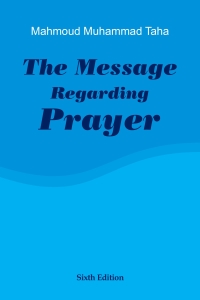In the Name of Allah, the Most Gracious, the Most Merciful
“So be patient over what they say and exalt [Allah] with praise of your Lord before the rising of the sun and before its setting; and during periods of the night exalt [Him] and at the ends of the day, that you may be satisfied. And do not extend your eyes toward that by which We have given enjoyment to [some] categories of them, [regarding] the splendor of worldly life by which We test them. And the provision of your Lord is better and more enduring.” (20:130-131)
Preface to the Fifth Edition
This is the preface to the fifth edition of the book The Message of Prayer. Praise be to Allah, the book has received significant interest and continues to be in demand, necessitating its reprinting. Prayer has always been, and will always remain, the greatest endeavor of humanity. Yet, people fail to recognize its true significance because they do not know how to pray.
Allah, Blessed and Exalted, says to His Prophet about prayer: “And enjoin prayer upon your family and be steadfast therein. We ask you not for provision; We provide for you, and the [best] outcome is for piety.” (20:132)
Here, piety (taqwa) means prayer. Thus, as [mindful] prayer ascends to its zenith, it becomes a means to obtain sustenance, rendering unnecessary the toil which is commonly seen as the [sole] means to achieve this end. But what kind of prayer is this? It is the prayer in which you are to your Lord as He is to you. He is always with you. Ask yourself: Are you always with Him? If not, then pray! For you have not truly prayed. You have not performed the prayer that leads to this state. The formal prayer (salat) you have been commanded to establish is meant to bring you to this true prayer.
Learn How to Pray.
This preface opens with two verses about prayer and contentment, which is the fruit of prayer. The term “exalt” (Sabbih) in the verse means pray. The term derives from (sabaha), which conveys movement, dispersion, and activity in pursuit of sustenance. [In the Qur’an] Allah references this meaning: “Indeed, for you by day is prolonged occupation (sabhan).” (73:7)
Thus, prayer is movement, from heedlessness to presence [of mind], from distance to proximity, from ignorance to knowledge. It must be a movement following Allah, not ahead of Him, in contentment with Him, not contesting Him. This is the meaning of His saying, Blessed and Exalted be He: "And glorify [Allah] with praise of your Lord." This is from His saying: "So be patient over what they say and glorify [Allah] with praise of your Lord before the rising of the sun and before its setting, and during parts of the night, and at the ends of the day, that you may be content" (20:130). Contentment is the tranquility of the self when it experiences calmness and comfort, through the stillness of turbulent thoughts within.
Learn How to Pray.
The Prophet was the greatest to ever pray, the greatest to understand prayer, and the greatest to recognize its value. When troubled, he would turn to prayer, and through it, the [heavy] hardships of the world would become light upon him. He would meet the Beloved, the Almighty, in prayer. He said: “Three things were made beloved to me in your worldly life: women, perfume, and the coolness of my eyes when focused in prayer.”
Reflect again: “and the coolness of my eyes when focused in prayer.”
The phrase “coolness of my eyes” denotes the tranquility of the self. The Prophet's inner self would become perturbed, his heart distressed, and his thoughts unsettled. He would then turn to prayer out of necessity. Upon standing in prayer, his insight would be illuminated by his vision of the Beloved, the Almighty - Allah. His inner self would be purified, his heart unburdened, his thoughts calmed, and he would be content with Allah, finding solace in Him: “and the coolness of my eyes when focused in prayer.”
Learn How to Pray.
Prayer is a methodology. By practicing it, we can look inward, meet ourselves, understand who we are, and achieve peace within. This is because we engage the external world, immersed in the illusions that our senses create, distracted by its outward appearance from its underlying truth. This external world is but a shadow of that [underlying] reality, which Allah has created as a guide to it, and not a substitute for it. Allah said: “We will show them Our signs on the horizons and within themselves until it becomes clear to them that it is the truth. So, is it not sufficient concerning your Lord that He is, over all things, a Witness?” (41:53)
The “signs on the horizons” are the means, while the signs within oneself are the ends. The means cannot replace the ends. To stop at the means, being veiled by them, is a manifest loss, and this is the affliction that we face, becoming entangled in its dangers. It is as though we are, in the depth of our heedlessness, a people asleep. Truly, we are a people asleep. Did not the Prophet say: “People are asleep; when they die, they awaken”? Indeed!
We have another means to become awakened, one that is beyond and before death, which is conscious, correct, and enlightened prayer. The Prophet commanded: “Die before you die.” He meant to lift the veil of heedlessness, to perceive the truths behind present appearances, through prayer, rather than through the eventuality of death when all regret will be too late.
Learn How to Pray.
This teaching is presented to lift the veils of illusions and falsehoods from your insight and vision. This book, The Message of Prayer, was written for this very purpose. May Allah make it beneficial, for He is the Best Patron and the Best Responder.

